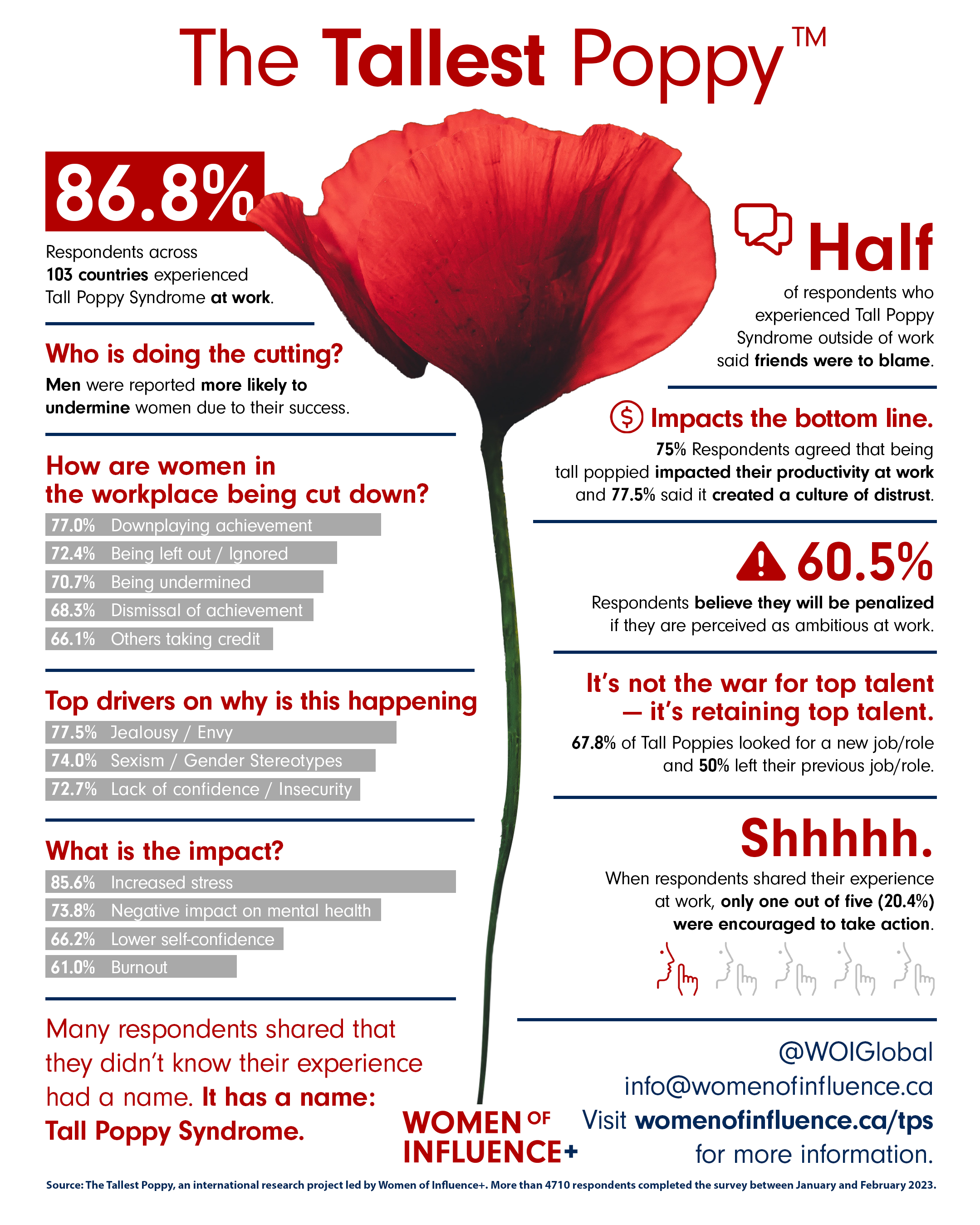

Features
Culture
Diversity & Inclusion
Successful women are being bullied, challenged on progress: Tallest Poppy 2023 study
March 1, 2023
By
Talent Canada
 Rumeet Billan, CEO of Women of Influence+.
Rumeet Billan, CEO of Women of Influence+. Successful women are being bullied and belittled, challenged on their progress, and made to feel as if it’s not their place to take up so much space.
That’s the finding from the global Tallest Poppy 2023 study from Women of Influence+ which found 86.8 per cent of women have experienced “Tall Poppy Syndrome” in their careers.
The syndrome occurs when people are attacked, resented, disliked, criticized or cut down because of their achievements and success.
“Our data tells an eye-opening story about how (it) negatively impacts ambitious, high-performing women, and what this means for organizations,” said Rumeet Billan, CEO, Women of Influence+ and author of the study.
“When reading through the stories and personal experiences from respondents, we noted a recurring them: those who had, or are, experiencing Tall Poppy Syndrome did not know these phenomena had a name. Not only does our data reveal the negative effects of being cut down because of one’s achievements, it helps us understand how the cutting is being done, who is most likely to do the cutting and, most importantly, legitimizes the experience of women who, in many cases, have experienced this throughout their careers.”
Who is holding the shears?
While many women point the finger at other women, the data tells a somewhat different story, according to Billan.
Men in leadership positions were more likely to penalize or undermine women due to their success. Women, on the other hand, were more likely to cut down peers or colleagues.
The act of cutting someone down because of their achievements or success manifests in the workplace in a number of different ways, including:
- 77 per cent had achievements downplayed
- 72.4 per cent were left out of meetings and discussions, or were ignored
- 70.7 per cent were undermined because of their achievements
- 68.3 per cent had their achievements dismissed
- 66.1 per cent said others took credit for their work.
The impact
Experiencing Tall Poppy Syndrome can have a detrimental effect on self-confidence and well-being. The survey found:
- 85.6 per cent experienced increased stress
- 73.8 per cent said it had a negative impact on their mental health
- 66.2 per cent cited lower self-confidence
Other effects included feelings of isolation and burnout, and the lack of desire to share or celebrate one’s success or accomplishments. It can lead to damage to an organization’s culture and cause top talent to burnout, check out and ultimately leave.
“Organizations often talk about the ‘war for top talent’ when, instead, there should be a focus on retaining top talent,” said Billan. “As a result of Tall Poppy Syndrome, high-performers are minimizing their skills and accomplishments.”
This is because they believe they will be penalized if they’re seen to be too ambitious at work, she said.
“When ambitious workers find themselves in an environment where excelling is penalized, their productivity will be impacted, and they will have one foot out the door,” said Billan. “This not only negatively impacts the individual, but the organization as well.”
What organizations can do
Organizations need to listen when someone comes forward with a report of being cut down or diminished in the workplace, the study authors said.
One of the respondents said: “Name it. Talk about it. Share how it’s unacceptable and why. What it does to people, teams, and the organization’s success and culture.”
People who are behind the cutting also need to be held responsible with real and impactful action.
“Stop talking and take action,” said one respondent. “Hold people accountable for their actions,” said another. “Recognize it. Recognize that women are treated differently when successful.”
Other tactics to adopt include:
- setting a standard and culture of trust and transparency
- a zero-tolerance approach — “don’t look the other way,” said one respondent
- investment in training for all employees
- celebrating wins.
“Normalize promoting qualified women into positions of power,” one respondent said.
About the survey
The study was carried out in 2023 via an online survey sent to contacts in the Women of Influence+ database and via social media. Most of those who received the survey identify as women, the authors said.
It was sent out on Jan. 9, 2023, and closed on Feb. 10, 2023. It attracted a total of 4,710 respondents from 103 countries.
The infographic
Print this page
